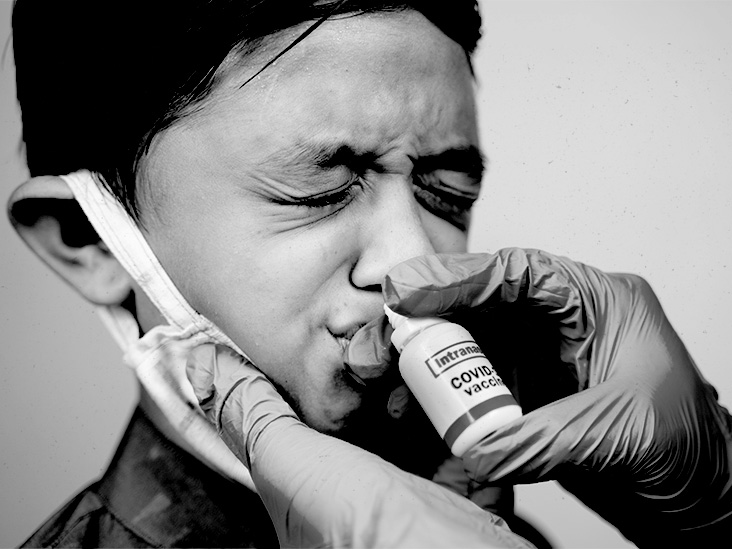
- About 1 in 10 people put off getting their COVID-19 vaccine due to a fear of needles.
- Two companies — one in China and one in India — recently received approval in their respective countries for intranasal vaccines to prevent SARS-CoV-2 infection and severe COVID-19 disease.
- Some medical experts believe nasal vaccines will offer new benefits for use and efficacy.
As the COVID-19 pandemic continues, new vaccines to prevent infection with SARS-CoV-2, the virus that causes COVID-19m are under constant development.
Up to now, all approved COVID-19 vaccines have been subcutaneous — that is, administered under the skin, often by injection into the upper area of the arm.
Now, two companies are planning to change that through the development of COVID-19 vaccines inhaled through the nose.
CanSino Biologics, a Chinese pharmaceutical company, recently received approval from the National Medical Products Administration of China for Convidecia Air, their recombinant vaccine delivered via inhalation, as a nasal spray.
Bharat Biotech International, a biotechnology company headquartered in India, has been granted approval under Restricted Use in Emergency Situation in India for its iNCOVACC recombinant vaccine administered intranasally as nasal drops.
The most common way of administering a vaccine continues to be through an injection. However, this is not the first time scientists have developed an
There have also been studies conducted on nasal vaccines for other diseases, including pertussis (whooping cough), hepatitis B, and the African swine fever virus.
Some researchers believe that delivering a vaccine nasally provides the benefit of administering the vaccine directly into the mucosa of the body. The mucosa, or mucus membrane, is the moist inner layer of body cavities, such as the nose and mouth, as well as some organs. The glands in the mucosa are what produce mucus.
The mucosa is an important part of the body’s immune system. When a person breathes, the mucosa helps keep bacteria and other potentially problematic particles from getting into their body.
The mucosa also absorbs certain pathogens. And because the nose connects to the body’s respiratory system, this makes it easy for a nasal vaccine to move through the body.
Additionally, nasal vaccines provide less stress for people who are afraid of needles.
Both Convidecia Air from CanSino Biologics, and iNCOVACC from Bharat Biotech International Limited are
That means they use a protein from the SARS-CoV-2 virus in the vaccine. When the vaccine enters the body, the protein attaches to cells in the body, teaching them to trigger an
Both of these intranasal vaccines also use
Researchers have also conducted studies on using adenovirus vectors as a vaccine platform for other diseases, including
According to statements on CanSino Biologics website, Convidecia Air uses the same adenovirus vector technological platform as Convidecia, the company’s injectable COVID-19 vaccine.
Convidecia recently received emergency use listing from the World Health Organization (WHO). The phase 3 clinical trial results for Convidecia showed a
Bharat Biotech’s iNCOVACC nasal vaccine was developed in partnership with Washington University St. Louis. The intranasal vaccine reportedly showed “successful results” following phase 1, 2, and 3 clinical trials.
Although these are the first two intranasal COVID-19 vaccines to receive approvals, there are
For example, a team of microbiologists at Mount Sinai is currently developing an intranasal COVID-19 vaccine candidate that is in or has completed phase 1 and 2 trials in Thailand, Brazil, Mexico, and Vietnam, with a phase 1 trial recently launched at Mount Sinai in the U.S.
According to Mount Sinai public communications, this novel intranasal vaccine is an egg-based vaccine that uses
In March, the University of Oxford reported the launch of phase 1 clinical trials investigating the delivery of a nasal COVID-19 vaccine it developed in partnership with AstraZeneca.
And in May, Codagenix, a vaccine development company based in the U.S., announced the start of phase 1 clinical trials for its CoviLiv intranasal COVID-19 vaccine candidate.
Medical News Today spoke with Dr. Fady Youssef, a board-certified pulmonologist, internist, and critical care specialist at MemorialCare Long Beach Medical Center in Long Beach, CA, about these new intranasal vaccines and what benefits they might offer.
“I think it’s great to have different options for patients that they can choose from, whatever they’re most comfortable with,” he stated.
“We’ve used nasal vaccines for other diseases. Some influenza vaccines are given intranasally and they work pretty well. So the mode of administration and of itself should not be held against or for the vaccine. It’s going to be more of a data about the tolerability and how good of a response the host amounts to.”
– Dr. Fady Youssef
As intranasal COVID-19 vaccines become more readily available, Dr. Youssef suggested people talk to their doctor to make sure it is the right vaccine delivery system for them.
“Some patients that may have had nasal surgeries, have sinus issues, or have nasal polyps, [so] this may not be the best option for them,” he cautioned.
And Dr. Peter Palese, Horace W. Goldsmith professor and chair in the Department of Microbiology and professor in the Department of Medicine at the Icahn School of Medicine at Mount Sinai, said that while mRNA vaccines against SARS-CoV-2 — such as those from Pfizer and Moderna — are effective in reducing infection rates and lessen the severity of disease, even multiple immunizations with the current vaccines do not prevent breakthroughs of infections and are less than perfect in eliminating transmission from person to person.
“Thus, vaccines administered via the nose inducing mucosal immunity should show improvements in terms of breakthrough infections and the spread of the disease,” he noted.
“The approval of such vaccines in China and India produced by CanSino Biologics and Bharat Biotech, respectively, represent a major step forward towards effective mucosal COVID-19 vaccines,” said Dr. Palese.






